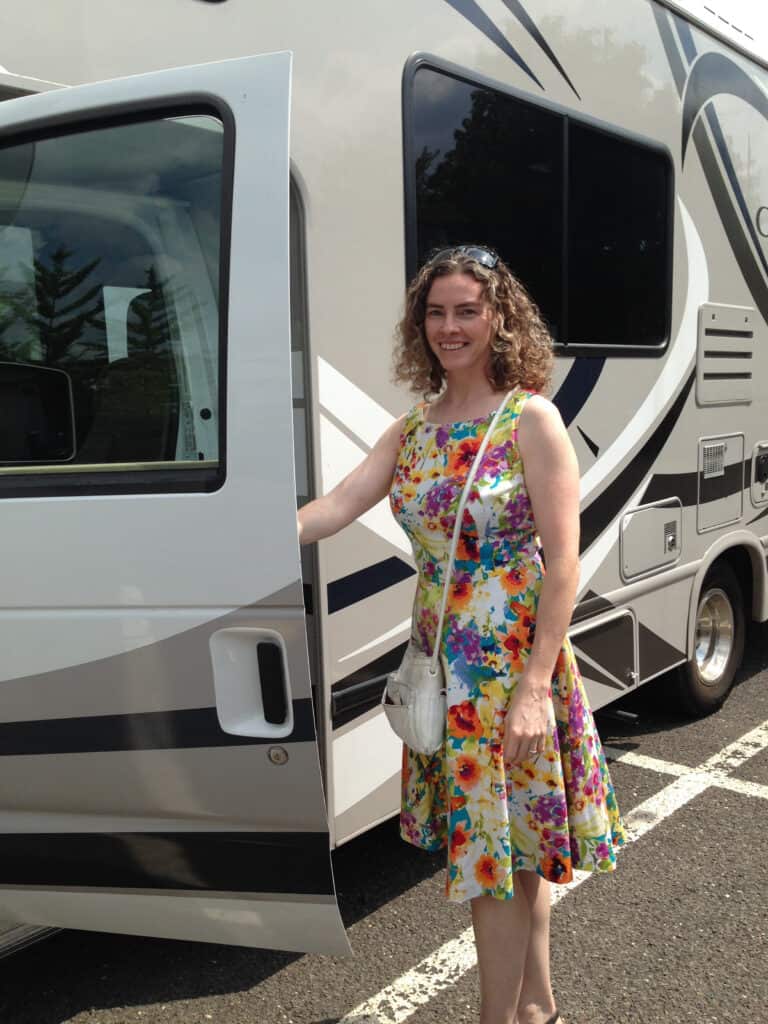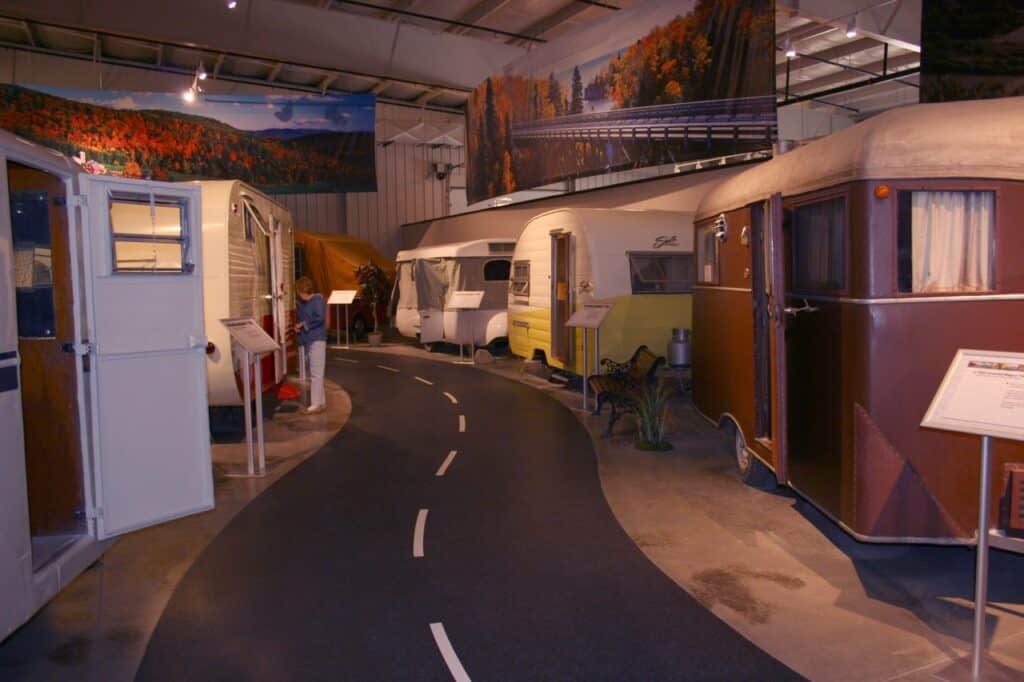Last summer, buying an RV and taking off across the country seemed like a perfectly awesome thing to do—and it still does. I think many RVing women in their 30s (like me) have these thoughts about improvisational travel, but few of us act upon those thoughts.
Well, here’s one young single woman who did. And it was on my way through Elkhart, Indiana, the proud and self-proclaimed “RV Capital of the World,” that I started to realize that RVing women are unusual in the eyes of the rest of RV America.
Curiosity and a sense of RV fellowship prompted me to follow the signs to the Recreational Vehicle/Manufactured Housing Hall of Fame and pay a visit. I met the nicest, gentlest museum guide you can imagine. He answered every question and more; he made sure I had everything I needed and wanted while I was there; he asked me questions and praised my dedication to learning and exploration.
RV-MH Hall of Fame
The museum gift shop was a large glass-paneled room filled with T-shirts, mugs, books, RV models, and the sort of RV paraphernalia you would expect. But the attendant led me to a small table by the staircase and said kindly, “This is the women’s table.” On it lay two sets of books for sale and a stack of pink T-shirts.
I’m not sure what he expected. Was I supposed to say, “Thank God, someone here understands me!”
There were other occasions where I felt more offensively underestimated, and that RVing women aren’t respected the same as their male counterparts.
Propane Pains
Across town, still in Elkhart, I pulled the RV into a parking lot where propane was advertised. Getting out, I took a cursory glance around and walked inside.
Several male attendants were behind the counter. I said I needed to fill my propane tank and asked where their propane tank was. I tasted a flavor of condescension as an attendant looked at me and pointed outside through the glass window-walls: “It’s where that truck is parked.” And quite obviously, there it was—a huge white propane tank just across the lot, with a pickup parked next to it. I just hadn’t bothered to look for it myself.
Why didn’t he say, “There’s the propane tank?” I believe he didn’t think I would recognize it. He thought he had to point out something easy and accessible.
First-Hand Knowledge
But I know more than what propane tanks look like, and so do most if not all RVing women. I understand what propane means for heat and energy. Especially in northern American prairie towns and mountainside communities, where winters are bitingly, dangerously cold. I saw the tanks in backyard after backyard while winding my RV through small neighborhood roads. Is there anything unfeminine about understanding the way people live?
And I know how the RV tank filling process works. At a filling station, you can’t do it yourself legally due to the chemical dangers involved. So, when my propane tank needed filling I would get out and watch and take pictures.
The supply tank is always in a caged pen and the office will send out an attendant to do the job. There are two valves on the RV propane tank: one to loosen the pressure, and one to attach the tube from the supply tank. Then there is a pressure gauge. I can picture the scene in my head.
You can only fill your RV propane tank three-quarters of the way full—it can never reach capacity or it will explode. When it has enough, little white flecks will start spurting out from the bleeder valve. It costs about $20 to “fill” a 40-pound tank. And it smells repulsive, like sulfur, or rotten eggs.
More of the Same
That unmistakable expression and tone of condescension toward RVing women also cast a shadow over the faces of service technicians along the way.
The general RV environment seems to be encapsulated in the signs I observed repeatedly while making my morning exit from the campgrounds: “Slides in? Awning in? Wife in? Drive Safely!”
There are two gender-based assumptions here: that the man is driving, and that the man is taking care of the RV travel chores.
Observation and experience tell me that statistically these assumptions are not unfair. But they serve as a constant reminder that RVing women and drivers upset the balance of the traditional RV family give-and-take.
For now, we are an anomaly. But many RVing women have told me I am an inspiration to them—and that encourages me.
Surprise
Aside from these few incidents, I think the point of view of most male RV travelers and service techs is based not on a sense of female limitation—a belief that the single traveling life is beyond the capabilities of RVing women—but rather surprise and wonderment that the RV lifestyle would appeal to a single woman. As my trip stretched out, I glimpsed the light of admiration in the eyes of many men and women.
At the Elkhart museum, I do not believe they were trying to prevent women from experiencing RV culture or joining their special world. They simply lack faith that women will enjoy what they have to offer. Associates feel they have to go out of their way to make the RV world interesting to us. They think women will not take ownership of the RV life unless it is draped in pink colors or has the word “women” to advertise it.
From My Perspective
From this woman’s point of view, nothing could be further from the truth. What’s not to love?There’s the freedom of the open road. You have your very own hotel room on wheels. And you have people to meet and marvels to see and air to breathe and many, many things to do. Plus, the RV is a huge, fun project. I poured myself into learning how to use it and take care of it, and it’s a special feeling to be capable, knowledgeable and strong.
And of course, there’s the driving. It does take practice but with perseverance and concentration, you learn your way around the mirrors and parking angles, and to gauge distances, and the safe balance of centripetal and centrifugal force when zooming through curved mountain roads.
The toilet tank dumping process is unappealing but that’s a very minor thing compared to the rewards of the RV lifestyle.
Hit The Road
I found the Elkhart museum fascinating from start to finish.
At the end of my tour, the museum guide finally could not contain himself, and he looked me in the eye and shyly, humbly spoke these very words: “You’re a beautiful woman. I’d follow you to the ends of the earth.”
He’ll have to chase me in my RV!
Tara Buzash Bhrushundi is a musician and RVer who lives in East Windsor, New Jersey.



Leave a Reply